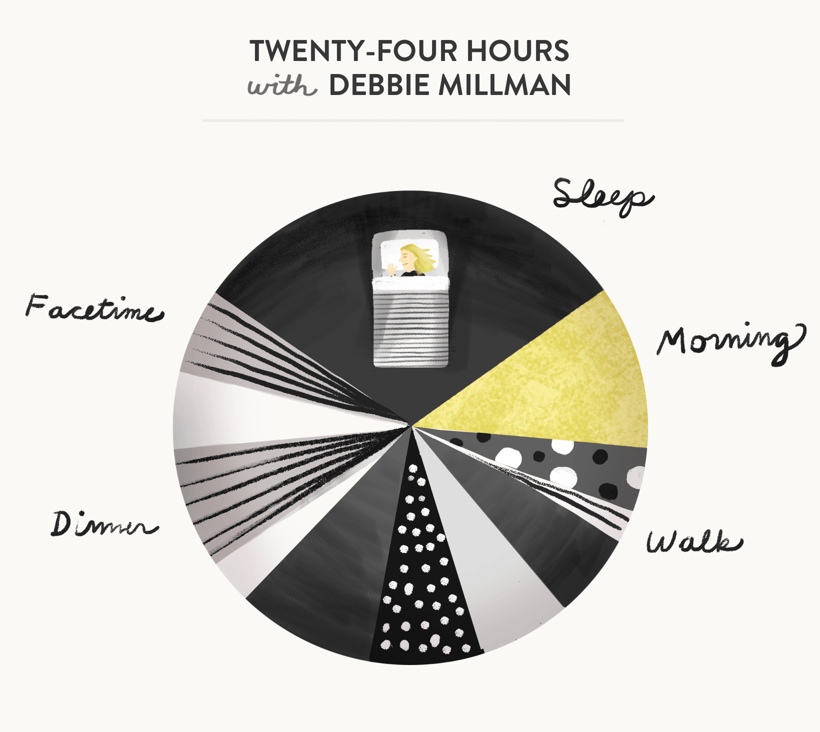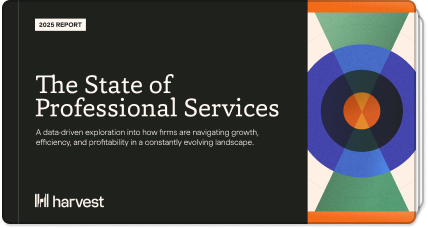When it comes to making time count, Debbie Millman is no stranger. A champion and advocate of the long-run, Debbie is a prolific writer, designer, educator, artist, brand consultant, and the host of the podcast Design Matters.
For the past 15 years, Debbie has interviewed hundreds of incredibly creative people about how they design the arc of their lives. What’s their secret? How do they use their time? In what ways did their journeys shape them? To show up again and again with inquisitive and wise questions, without fail, is one of Debbie’s many superpowers.
Debbie urges us to get honest about what’s truly important and worth our time. She shares the remarkable insights she’s gained and questions she’s asked over the course of her career and life.
Debbie, you’ve said that, “you don’t find the time to do something; you make the time to do things.” What strategies have worked for you in determining what is a “no” and what is a “yes?”
Of the many, many excuses people use to rationalize why they can’t do something they say that they want to do, the excuse “I am too busy” is the least likely to be true. I don’t believe in “too busy.” I think that “busy” is a decision. We do the things we want to do, period. If we say we are too busy, it is shorthand for “not important enough.” It means you would rather be doing something else that you consider more important. That “thing” could be sleep, it could be sex, or it could be watching Game of Thrones. If we use busy as an excuse for not doing something, what we are really saying is that it’s not a priority.
Simply put: you don’t find the time to do something, you make the time to do things. We are now living in a society that sees busy as a badge. It has become a cultural cache to use the excuse “I am too busy,” as a reason for not doing anything we don’t feel like doing.
The problem is this: if you let yourself off the hook for not doing something for any reason, you won’t ever do it. If you want to do something, you can’t let being busy stand in the way, even if you are busy. Make the time to do the things you want to do and then do them.
Here are some questions to consider when you think you are too busy to do something:
Is the task I am using as an excuse to not do the task I want to do really legitimate? Do I really need to be doing this now?
If the answer is yes, then ask yourself the following: How can I reorganize my time to allow for space to do this other thing that is really important to me? What can I give up that is not as important to ensure that I can make the time to do it?
If the answer is no, then ask yourself the following: Why am I procrastinating? What am I avoiding? Why am I creating obstacles to stand in the way of my doing the task I want to be doing? Am I lying to myself about really wanting it? Why am I so reluctant to get started?
Be as honest with yourself as you can as you think about these questions. Really own the answers. See where they take you.
“Simply put: you don’t find the time to do something; you make the time to do things.”
Your podcast, Design Matters, was one of the world’s very first podcasts. What are your biggest takeaways from exploring how hundreds of people design the arc of their lives?
The show has evolved to a singular interview format. Throughout each episode, I seek to reveal the trajectory of a creative life. I believe that the arc of a career is a circuitous one. I am fascinated by how people become who they are and how the decisions in their lives impact their work. As for its longevity, as long as people will listen, I will continue to do the show. I am a person that is very dedicated to the things I choose to do, and I hope I continue to create new episodes of Design Matters for the rest of my life.
The one common denominator that I can share among all the brilliant people I’ve interviewed, more than 500 designers, authors, illustrators, educators, scientists, performers and creators, is that they all feel like they have to get up every day and do it again. They all feel like they very well may be discovered as phonies. They very well may never achieve what they’d hoped.
The only two people in all the years that have had a different experience in articulating who they are and what they believe are Milton Glaser and Massimo Vignelli. I think the common denominator that they share is that they’re both in their 80s. They have no f’s left to give. I hope by the time we are 80, we’ll all be OK, saying: “This is the way I am, and I’m totally fine with who I am, as is.”
“The one common denominator that I can share among all the brilliant people I’ve interviewed [...] is that they all feel like they have to get up every day and do it again.”
Practically speaking, producing Design Matters must take a lot of coordination. What are your tricks for effective project management?
One of the biggest tricks for effective management is to finish what you start. I almost always finish what I start. I am a firm believer that no matter how good or bad you think something is, there is a benefit to actually completing it. Not everything you make has to be perfect.
You learn as much from the strikeouts as you do from the home runs and it is important to understand why you struck out to really learn about the conditions that led you to strike out. It helps you improve your form and also takes some of the pressure off of experimenting.
You always manage to find an obscure fact or anecdote about the person’s life you’re interviewing. How does it set the tone of your time together?
In every interview, I try to start with something that completely surprises the person I’m talking to, so they laugh, and immediately are at ease by realizing how much respect I’m showing them in the body of knowledge I have. If they laugh and are caught a little off guard, then hopefully they become more comfortable talking deeply and really revealing who they are.
Before I interview someone, I research them until I have in the neighborhood of 40 to 50 pages of research. Then I chronologically lay out my questions from the beginning, where I want to start, to the end, where I want the conversation to go, ideally. I then cull my body of research, which covers everything from the person’s accomplishments, failures, personal life, and responses in previous interviews, into 10 pages of questions. After two more rounds of edits, I net out at about five pages of questions and ideas, which makes for a one-hour interview.
I try to think of interviewing as a game of pool. When you’re playing pool, you want to get the billiard balls in a hole, but you also want to leave the rest of the balls on the table, so you can continue to get more billiard balls in more holes. As an interviewer, your question is the cue ball: it should land an awesome response and spark many other conversational directions. What I try to do is ask a question that allows a conversation in as natural and organic a manner as possible.
“As an interviewer, your question is the cue ball: It should land an awesome response and spark many other conversational directions.”
Patience is a theme that shows up in many of your interviews and talks. Why do you believe that good work takes time, and how do you cultivate patience?
We are living in a culture that leads us to believe that when you graduate from college, you are expected to know exactly what you want to do, where you want to do it, and what your life plan will be. And if you aren’t successful right out of the gate, there must be something wrong with you. This emotion builds into a palpable sense of hopelessness if you aren’t able to achieve something quickly.
I believe that anything worthwhile takes time. Mastery is a process of years. If you are one of the few souls in the world that are actually able to hit it out of the ballpark before you are 30, you might want to consider how you are going to be able to sustain that success over the long term. The pressure to keep succeeding over and over will mount and you will likely feel that you must only hit home runs. This is impossible.
Take your time and build your skills. Refine your methodology over time and give yourself the opportunity to grow and develop. Use your twenties to experiment. It’s a time when falling flat on your face is expected. Build something meaningful rather than build something fast. The length of time it takes for you to succeed is generally a good measure of how long you will be able to sustain and enjoy it.
In thinking about the speed of success, consider the following questions:
- What are you rushing for? Are you competing with yourself or other people?
- Are you in a race to succeed in order to feel better about who you are? Why do you think this will work?
- What would you rather have: instant, unsustainable success wherein you become a has-been before 30, or a slow build to a meaningful career that has normal ups and downs?
“Build something meaningful rather than build something fast. The length of time it takes for you to succeed is generally a good measure of how long you will be able to sustain — and enjoy — it.”
We’re all aging. How has this process impacted your perspective on life and approach to your work?
As I’ve been getting older, I have become increasingly concerned with time. I used to feel that my life was infinite; I never worried about having enough time to do all the things I want to do. Now I feel the passage of time in ways that I never imagined.
So my creative energy is fueled by the notion that there is so much I want to do, and I never, ever want to waste time. And I find that I ask myself this question nearly every day, and it helps put things in perspective: if not now, when? Works like a charm to get started!
You’ve talked before about designing a life through the use of a specific tool: the “Ten Year Plan for a Remarkable Life.” Why do you think this exercise resonated with so many people? Why do you think ten years is the right time frame to ground the exercise?
This exercise was originally created by Milton Glaser in a summer intensive program I took with him at the School of Visual Arts, where I now teach. The original essay was a five-year plan, but I increased it to ten years in an effort to give younger people more runway. (My class with Milton Glaser was for mid-career designers, yet today, I teach college students).
In the essay, I ask you to imagine the exact life you want ten years into the future and then write it all down in a detailed essay. What will your life be like? Where will you be living? What will you be doing for a living? What will you look like? Who do you live with? What type of job do you have? What have you accomplished? What makes you happy?
Outline as much of the life you wish to have for the most perfect day imaginable ten years from now. Envision it and write it all down, as detailed as possible. It can be as long as you like and write as if your life depends on it, because it does!
I think the exercise has resonated with so many people for a few reasons, some of which are the following:
- It gives you a framework to imagine your future in exactly the way you want it.
- You have the freedom to create your own life.
- You are only limited by your imagination.
- It gives you great hope and optimism about what you want.
What’s something that you used to believe that you changed your mind about?
I came out in 2012! I had lived a very straight life until that time (and I was 50 when I came out) and finally, for the first time, I had the courage to follow my heart.
What’s one non-negotiable thing you always make space for in your life? What’s something you’d like to do less of?
Until I met my fiancée Roxane Gay, I always made time for sleep. I need a good eight hours every night. Falling in love has made that difficult, but we’re both hoping that things will settle down a bit now that we’re officially legally obligated!
Some things I’d like to do less of:
- Worry.
- Feel insecure and/or doubt myself.
- Sit on the tarmac in airplanes.
- Feel afraid of what I want.
What makes you feel like you’ve spent your time well?
I can look back on my life now and I feel very, very grateful. Every decade of my life has gotten incrementally better. It started out with a lot of pain, and in a lot of darkness, but I’ve worked hard to try to make the kind of life I’m proud of. And I’m still getting started! I hope to continue to make a remarkable life for the rest of my life.
“If not now, when?”
Imagine you’re reflecting at the end of a day or other period of time where you felt that your time was well spent. What did you do? How did it feel? How much time did you spend doing it?
- Sleep. Hoping and wishing for 8 hours.
- Time for coffee and to daydream, write, read, draw, and make things. (2 hours, morning)
- Therapy a few times a week. (45 minutes, morning)
- Walk over to the School of Visual Arts, pop in to Sullivan Street Bakery on the way. (15 minutes, midmorning)
- Office time at SVA, including eating lunch at my desk and meeting with colleagues and students. (1 - 2 hours, early afternoon)
- Conference calls or in-person meetings. (1 - 2 hours, afternoon)
- Podcast preparation or actual interview. (1 - 2 hours, afternoon)
- Teach graduate or undergraduate classes. (3 hours, late afternoon)
- Walk home. (15 minutes, early evening)
- Meet friends for drinks or dinner. (1 - 2 hours, evening)
- Watch Rachel Maddow. (1 hour, late evening)
- Facetime with Roxane. (1 hour, late evening)















